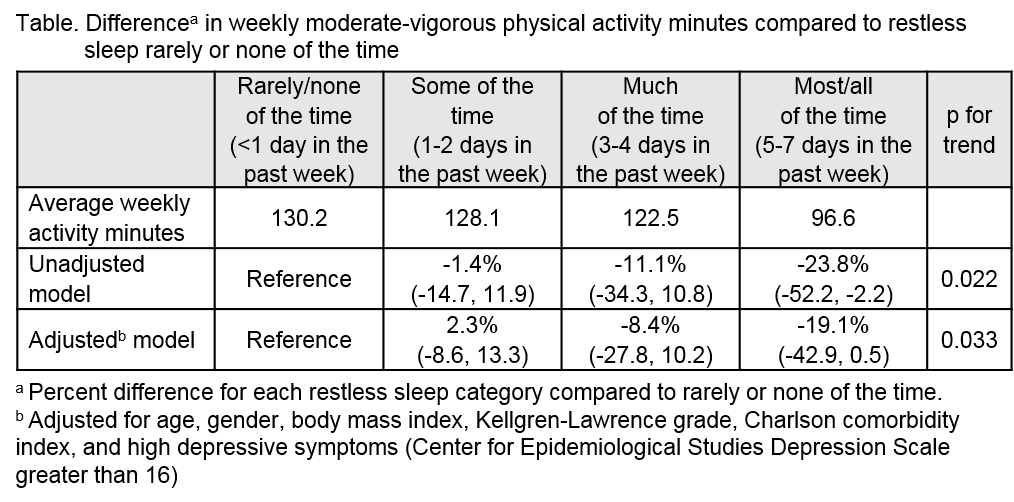Session Information
Date: Tuesday, November 7, 2017
Title: Osteoarthritis – Clinical Aspects Poster II: Observational and Epidemiological Studies
Session Type: ACR Poster Session C
Session Time: 9:00AM-11:00AM
Title: The Relationship between Self-reported Restless Sleep and Objectively Measured Physical Activity
Background/Purpose: Despite many health benefits of physical activity, inactivity is endemic among adults, especially those with knee osteoarthritis (KOA). Attempts to sustain long-term increases in physical activity in adults with KOA show limited success. Poor sleep is a potentially powerful modifiable risk factor but is under-investigated as a determinant of physical activity. Sleep may be a novel target to improve physical activity. However the relationship between sleep and physical activity in individuals with KOA remains unknown. We evaluated if participants with greater self-reported restless sleep were more likely to have decreased physical activity.
Methods: The Osteoarthritis Initiative (OAI) enrolled adults with or at high risk for radiographic KOA. Clinical data and physical activity data by accelerometer monitoring were collected at the 4 year follow-up visit. We evaluated weekly minutes of moderate-vigorous activity stratified by responses to the Center for Epidemiological Studies-Depression (CES-D) question on frequency of restless sleep in the past week. Due to skewed distribution, weekly moderate-vigorous physical activity was log-transformed. We repeated the analysis adjusting for potential confounders including age, gender, BMI, KOA severity, Charlson comorbidity score and depressive symptoms (CES-D>16).
Results: Complete data were available for 1900 OAI participants. A total of 169 (9%) reported they experienced restless sleep much of the time (3-4 days in the past week), and 132 (7%) reported restless sleep most or all of the time (5-7 days in the past week). Participants who reported 3-4 days and 5-7 days of restless sleep had 11.1% and 23.8% less weekly minutes of moderate-vigorous activity, respectively, compared to participants reporting restless sleep rarely or none of the time. These results were similar when adjusted for potential confounders with 8.4% and 19.1% less moderate-vigorous activity for restless sleep reported 3-4 days and 5-7 days, respectively, compared to those who rarely reported restless sleep (p for trend 0.0330).
Conclusion: Participants who reported restless sleep much or most of the time performed less moderate-vigorous physical activity than those who rarely reported restless sleep. Some of this effect might be mediated by depression. Future research could focus on characterizing the mechanisms of how poor sleep might result in less physical activity and the possibility of a bidirectional relationship.
To cite this abstract in AMA style:
Gilbert A, Lee J, Song J, Semanik P, Ehrlich-Jones LS, Kwoh CK, Dunlop DD, Chang RW. The Relationship between Self-Reported Restless Sleep and Objectively Measured Physical Activity [abstract]. Arthritis Rheumatol. 2017; 69 (suppl 10). https://acrabstracts.org/abstract/the-relationship-between-self-reported-restless-sleep-and-objectively-measured-physical-activity/. Accessed .« Back to 2017 ACR/ARHP Annual Meeting
ACR Meeting Abstracts - https://acrabstracts.org/abstract/the-relationship-between-self-reported-restless-sleep-and-objectively-measured-physical-activity/

